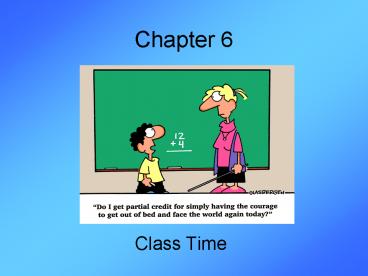Class Time - PowerPoint PPT Presentation
1 / 21
Title:
Class Time
Description:
Use the seven critical thinking skills to help you objectively ... Avoid monotony. Recognize that your attention has to be renewed; it is not an unending source ... – PowerPoint PPT presentation
Number of Views:41
Avg rating:3.0/5.0
Title: Class Time
1
Chapter 6
- Class Time
2
NOTESThe Traditional Outline
- I. Main topic 1
- A. Subtopic
- 1. important detail
- 2. important detail
- II. Main topic 2
- A. Subtopic
- 1. important detail
- 2. important detail
- III. Main topic 3
- A. Subtopic
- 1. important detail
- 2. important detail
3
Understanding instructor expectations
- Requirements of the course
- Evaluation procedurestypes of tests
- The instructors teaching style
- Use the seven critical thinking skills to help
you objectively evaluate your own skill in the
course
4
Active Learning Seven Steps to Success
- Preparation
- Engagement
- Punctuality
- Seat location
- Passion
- Attendance
- Review
5
Essential Strategies to Prepare for Lectures
- Familiarize yourself with the topic before class.
- Familiarize yourself with new terminology,
symbols, formulas, and equations. - Enter the classroom with a positive, receptive
attitude. - Leave stress and emotional issues at the door.
- Take care of personal comfort needs before you
enter the classroom.
6
Essential Strategies to Prepare for Lectures
(Cont)
- Be mentally alert.
- Sit in the front of the room.
- Identify your listening goal.
- Set goals that include specific listening
strategies to implement during the lecture. - Be prepared with appropriate materials.
- Begin taking notes as soon as the lecture begins.
7
Factors that Influence Listening
- Your attitude
- The topic
- The speaker's qualities
- External distractors
- Personal factors
8
Listening
- Listening involves understanding what you are
hearing and having the ability to hold verbal
stimuli in working memory long enough to attach
meaning to the words and to interpret what the
speaker is saying. - Listening is not the same as hearing.
- Listening is an active process that engages the
listener in a variety of mental processes.
9
How do we communicate?
10
Speech, Writing, and Thinking Rates
- Average rate of speech during lectures
- 100-125 wpm
- Average rate of writing
30 wpm - Average rate of thinking
400 wpm
11
How to Pay Attention
- In class you can
- Look for verbal and non-verbal clues from the
teacher - Stay involved in the class discussion
- Move your seat away from distractions
- Listen to what classmates say and ask
- Take notes and review them
- Come to class prepared read your assignments
12
How to Pay Attention
- Outside of class you can
- Get appropriate sleep each night
- Eat well and avoid foods that make you sleepy
- Exercise regularly
- Eliminate distractions as best you can
- Enjoy what you do
- Avoid monotony
- Recognize that your attention has to be renewed
it is not an unending source - Avoid substance abuse
- Laugh
- Try mental exercises or calisthenics
13
Strategies for Active Listening
- Familiarize yourself with the topic before class.
- Prepare questions about the topic to increase
interest and intention. - Show a positive, respectful, attentive attitude.
- Use concentration strategies to combat external
distractors.
14
Strategies for Active Listening (Cont)
- Create a relaxed state of mind use relaxation
techniques. - Focus on the speaker's message by using verbal
and nonverbal clues. - Listen carefully in group activities and be open
to other points of view. - Ask clarifying questions, paraphrase, and respond
to questions.
15
Steps in the Listening Process
16
Techniques for Adjusting to the Rate of Speech
- Paraphrase the speaker by shortening and
rewording. - Use abbreviations to reduce the amount of
writing. - Create a set of common symbols.
- Use a modified form of printing/writing.
- Keep writing.
- Stay focused.
17
Simple Abbreviations
18
Working With Your Lecture Notes
- Complete your notes after the lecture.
- Add more structure to your notes.
- Supplement your notes.
- Rewrite your notes when justified.
- Recite, reflect, and review your notes.
19
Did you miss the basics?
- I missed the basics. What can I do now?
- Missed class? Get notes from a classmate or visit
the instructor as soon as possible. - Arrived late? Turn off your cell phone, quietly
enter the room, hold the door so it does not
slam, and quickly find a seat. - Have difficulty focusing? Find a way to actively
engage yourself. - Left class early? Meet with your study buddy or
the instructor as soon as possible to get what
was missed.
20
Online course success
- Know how to use a computer.
- You need a computer, email, and Internet access.
- If there is an orientation for the course, find a
way to participate. - Back up all of your computer work on a regular
basis. - Stay up-to-date.
- Practice good netiquette.
- Online courses may be flexible but they still
require a large quantity of timeand a lot of
self-discipline. - Ask for help as soon as needed.
- Ask a current online student for advice.
21
Chapter Summary
- Be aware of your instructors styles,
expectations, and emphases. - Paying attention requires listening, observing,
and sorting through the vast amounts of
information. - Concentrate on behavior that will build a strong
foundation of support, encouragement, and
respect. - Being present in the classroom allows you to hear
explanations, ask questions, and add to the class
discussions. - Choose a note-taking style with which you feel
comfortable and consistently use it. - Make your notebook work for you. Keep it current
and review it every night.































